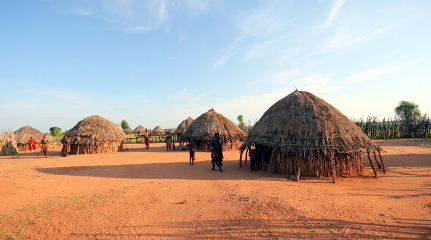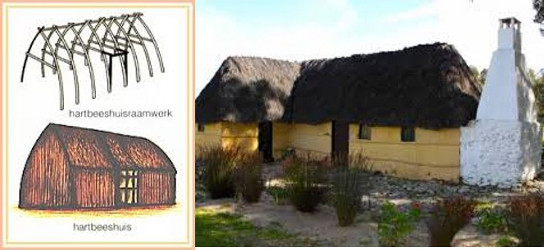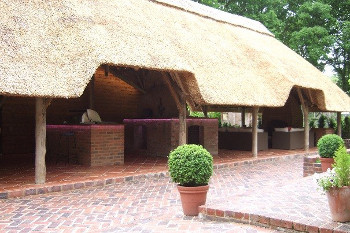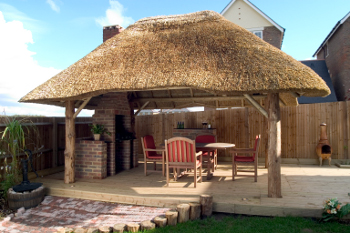
Origins of the Lapa
Though a recent addition to the UK, the Lapa is a commonplace feature in South Africa. Its history is set in the practical needs of the South Africans combined with the architectural style of the Dutch, resulting in the striking structures found today.
In the UK, The Lapa Company was founded by Craig Ormiston in 2005. After visiting South Africa on a number of occasions, Craig was inspired by the outdoor living culture and in particular the rustic Lapas that are used in South Africa for entertaining, relaxing and eating.
In bringing this african style garden building to the UK, Craig's main priority was to ensure that the craftsmanship and uniqueness of every Lapa was replicated authentically. The addition of Hentie to our team, an experienced thatcher in South African and UK thatching techniques, meant Craig was able to bring together all the skills needed to produce these beautiful buildings. This dedication to authentically replicating the South African build style means we continue to be the only company able to provide this structure in the UK.
What is a Lapa?
A Lapa (larpa) is a structure that usually consists of a thatched roof supported by wooden poles creating an open-sided enclosure. African Lapas are commonly used as semi-open entertainment areas and the word Lapa derives from the Sesotho word for 'homestead' or 'courtyard'.
The History of the Lapa, an evolvement from traditional African Huts

The Lapa is originally from the Sotho people in South Africa, North of the Orange River. This area experiences both brutally sunny days and heavy thunder showers and all the structures here have to be reliable in the changing climate.
The traditional african Lapa was built from naturally sustainable materials that were freely available from the savannah grasslands (grass, branches, sticks, stones and mud) and may commonly be thought of as an African hut. It was normally part of a kgoro or kraal where they would cook and prepare their food, spending time with family and friends.
The Lapa we know today evolved when the Boers (Dutch/Afrikaans for 'farmers') started the Great Trek away from the British controlled Cape colony in the 1830s and went onwards over the Orange River to where the Sotho people resided.

During this time the two different styles merged and started to form the Lapa we know today. With the influence of the Dutch thatching technique and building style combined with available construction materials, the Hartebeetshuisie (hard-reed house) emerged and was constructed using labour from the Sotho people in exchange for food and cattle.
With the end of the Great Trek and the arrival from Europe of farmed Populus and Eucalyptus trees in the late 1800s and early 1900s, the building improved rapidly to produce a modern style Lapa that still meets the needs of the average South African family.
The Modern South African Lapa

As Lapas are made from natural materials, they are only minimally affected by the strength of the sun, whereas shop bought gazebos don't last long in the same climate even with modern coatings.
Whilst constructed as a semi-open environment, the thick thatch of a Lapa provides not only shade, but also protection against rain showers and ensures it is suitable for many different uses all year round.
Lapas are still extremely commonplace alongside the main residential structure as a hosting area, and the additions of a built-in braai (BBQ) and fireplace ensures they are the perfect place for get-togethers. The Lapa building technique and style is also found incorporated into the design of commercial settings such as hotels and leisure facilities.
Lapas arrive in the UK

Since 2005 The Lapa Company have been building these stunning structures in the UK and Europe. Our expertise has grown over the years and we are proud to have a highly skilled team operating from our Kent workshop. Alongside the african Lapa our products now include an african thatched roof gazebo range along with themed umbrellas and Shelter Kits. The Lapa building itself has been embraced in the UK and we have constructed them in many residential settings as well as alongside Hotels and Schools.
Each one is unique and designed for the specific setting and needs of the customer. With bespoke integrations such as outdoor kitchens, seating, fireplaces and more, Lapas provide the ultimate outdoor living space.
In 2015 we celebrate 10 years of The Lapa Company and will be completing some truly unique builds from a Gambian inspired Lapa to our first 'Wedding Lapa'. We look forward to continuing our role as the only UK provider of the Lapa going into the future.
The Lapa Company is based in the heart of Kent where we handcraft a premium range of luxury Thatched Gazebos and Garden Buildings.
Our exclusive range includes Thatched Lapas, Tiki Huts, Spa Gazebos, Cedar Shingle Garden Buildings, Cape Reed Thatched Tiles, and Thatched Gazebos - available for installation and as a Gazebo Kit.
Premium Gazebo
Prestige Gazebo
Spa Gazebo
Lapa Buiding
Tiki Bar
Bespoke Gazebo
Outdoor Classrooms
For our Renson Louvered Canopies, Garden Rooms and Landscaping services visit life-outdoors.co.uk.
01732 884030
The Lapa Company UK Ltd
Unit 15, Orchard Place Business Centre,
Seven Mile Lane,
Borough Green,
Kent
TN15 8QU
© The Lapa Company (UK) Ltd 2025
Company Number: 04949894
Registered Office Address:
Fifth Floor Intergen House, 65-67 Western Road, Hove, East Sussex, BN3 2JQ

